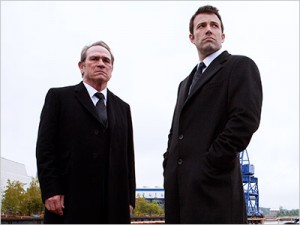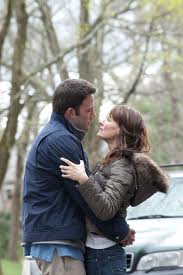The Company Men
 The most dominant trend in recent big budget films has been trying to humanize the superhero, as if he/she was a real person with real problems (Watchmen, Hancock, My Super Ex-Girlfriend, etc.). Sometimes, as with Defendor and Kick-Ass, the characters don’t have superpowers and the joke is not just their ineptitude but the annoyances of having to serve the public interest and fight crime, material that would generally be skipped over in a standard comic-book movie like Superman. The point of these films is to give faces to the faceless, develop an interior life for those we assume don’t have interior lives because they don’t have to worry about the common problems the rest of us are mired in.
The most dominant trend in recent big budget films has been trying to humanize the superhero, as if he/she was a real person with real problems (Watchmen, Hancock, My Super Ex-Girlfriend, etc.). Sometimes, as with Defendor and Kick-Ass, the characters don’t have superpowers and the joke is not just their ineptitude but the annoyances of having to serve the public interest and fight crime, material that would generally be skipped over in a standard comic-book movie like Superman. The point of these films is to give faces to the faceless, develop an interior life for those we assume don’t have interior lives because they don’t have to worry about the common problems the rest of us are mired in.
The same could be said about rich corporate types, the perception of the dilemmas they face are closer to “should I buy another yacht or invest in a mansion this month?” John Wells’ The Company Men tries to have us sympathize with a group of upper level corporate rich guys as they begin to suffer the effects of the recession. Those in the audience bumping up against the ages of a few of the lead characters played by Chris Cooper and Tommy Lee Jones may feel a twinge of recognition, especially when dealing with their own obsolescence. But that twinge immediately disappears once you realize that these guys have millions of dollars in stock options and their soulless existence is purely their fault.
 Could we possibly learn a lesson from Ben Affleck’s character, who didn’t save a penny and now has to worry about his kid’s private school and the payments on his expensive car, let alone the mortgage on the house? The way Wells doles out the information though, it’s pretty hard to feel sorry for Affleck, he was overextended before he got laid off and I’m not tearing up for his son because he has to return his Xbox 360. Wouldn’t this be a good opportunity for Affleck to either learn about or pass on the lesson of fiscal responsibility, or maybe teach his son that used video games can be bought dirt cheap on the internet? No, that would suggest that The Company Men was anything more than a pit-stop at misery (which would have been a more honest title). It’s a movie that fulfills every stereotype about Hollywood films, a smarmy, condescending moral lecture from a bunch of rich guys who have no idea what real poverty is. Do I begrudge the characters their financial success? No. But I’m certainly not going to feel bad when it falls apart.
Could we possibly learn a lesson from Ben Affleck’s character, who didn’t save a penny and now has to worry about his kid’s private school and the payments on his expensive car, let alone the mortgage on the house? The way Wells doles out the information though, it’s pretty hard to feel sorry for Affleck, he was overextended before he got laid off and I’m not tearing up for his son because he has to return his Xbox 360. Wouldn’t this be a good opportunity for Affleck to either learn about or pass on the lesson of fiscal responsibility, or maybe teach his son that used video games can be bought dirt cheap on the internet? No, that would suggest that The Company Men was anything more than a pit-stop at misery (which would have been a more honest title). It’s a movie that fulfills every stereotype about Hollywood films, a smarmy, condescending moral lecture from a bunch of rich guys who have no idea what real poverty is. Do I begrudge the characters their financial success? No. But I’m certainly not going to feel bad when it falls apart.
 And it’s not that a story like this can’t be told well; Albert Brooks’ Lost in America is probably the funniest movie of the 1980s, perfectly summed up by a scene where an oblivious Brooks shows up to the employment office of a trailer park town in Arizona and asks if he can look through the “$100,000 file.” There’s no biting insight like that in The Company Men, it’s just a movie that makes you fidgety with “who cares?” unease. Wells constantly throws away promising opportunities, turning all of the wives into unsympathetic shrews, playing only a musical riff from The National’s appropriately symbolic song Fake Empire so we don’t even get to hear the irony of the lyrics, and with his cast of well worn faces, skipping over the casting of the best lived-in weathered face in the business, Phillip Baker Hall.
And it’s not that a story like this can’t be told well; Albert Brooks’ Lost in America is probably the funniest movie of the 1980s, perfectly summed up by a scene where an oblivious Brooks shows up to the employment office of a trailer park town in Arizona and asks if he can look through the “$100,000 file.” There’s no biting insight like that in The Company Men, it’s just a movie that makes you fidgety with “who cares?” unease. Wells constantly throws away promising opportunities, turning all of the wives into unsympathetic shrews, playing only a musical riff from The National’s appropriately symbolic song Fake Empire so we don’t even get to hear the irony of the lyrics, and with his cast of well worn faces, skipping over the casting of the best lived-in weathered face in the business, Phillip Baker Hall.
 Even the subject matter it deals with, corporate restructuring, was outdone by The Joneses, released only 9 months ago, and was also a much sharper commentary on soulless materialism and financial envy as an American tradition. [Go rent The Joneses. It’s a funny satire about a fake family put together to sell products to their neighbors. The leads, David Duchovny and Demi Moore, couldn’t be better suited to play phony plastic people.]
Even the subject matter it deals with, corporate restructuring, was outdone by The Joneses, released only 9 months ago, and was also a much sharper commentary on soulless materialism and financial envy as an American tradition. [Go rent The Joneses. It’s a funny satire about a fake family put together to sell products to their neighbors. The leads, David Duchovny and Demi Moore, couldn’t be better suited to play phony plastic people.]
Only one image resonates throughout the film, a moment where a former corporate superstar sees his future, competing with hundreds of guys just like him sitting in the waiting room, to inevitably be insulted and underpaid, if they’re the lucky one to be hired. Wells had potential in the script, the last twenty minutes, before the bogus finale, is better about having Jones, Affleck, Cooper and others worrying about their own significance in the world. Still, The Company Men, shot with a cold blue filter over everything, does nothing to differentiate itself from any number of TV shows that premiere on TNT. Well, except that it’s a whole lot more patronizing towards the working man*, and there’s no way you’re about to weep for the wealthy because they spent a few months unemployed, but still got a hefty severance package. Scratch my title suggestion a few paragraphs up, something more accurate would have been, Get Over Yourself.
 * There’s a mishandled subplot with Kevin Costner as Affleck’s brother-in-law who runs a contracting business. Affleck has to swallow his pride and start working for Costner, so he can learn to be a real man with a hammer, not a slickster on a sales call. At the end of each day, Affleck is of course tired, but if this is supposed to represent the real world that he’s finally dealing with, he’d certainly be too exhausted to want to pay attention to people like him and movies like this.
* There’s a mishandled subplot with Kevin Costner as Affleck’s brother-in-law who runs a contracting business. Affleck has to swallow his pride and start working for Costner, so he can learn to be a real man with a hammer, not a slickster on a sales call. At the end of each day, Affleck is of course tired, but if this is supposed to represent the real world that he’s finally dealing with, he’d certainly be too exhausted to want to pay attention to people like him and movies like this.



